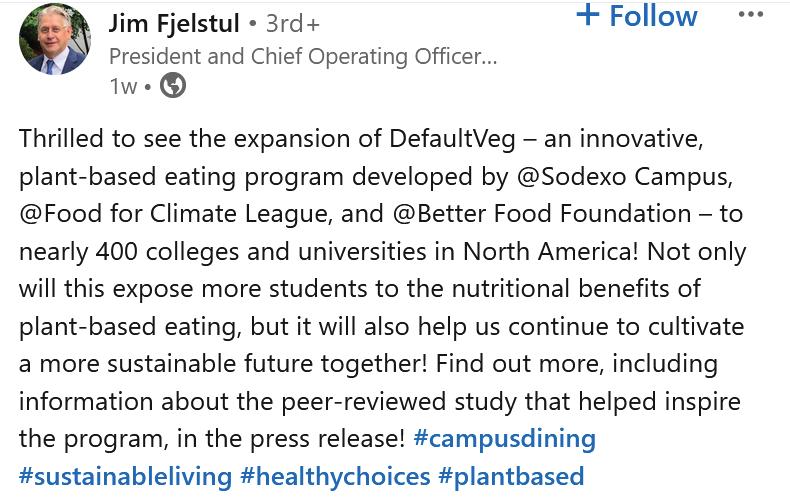

2023 Annual Report & 2024 Highlights







1) Scaling Plant-Based Defaults through our signature program, DefaultVeg, which targets institutions (e.g. university dining), decisionmakers (e.g. city policymakers), and activists (e.g. student changemakers) to flip how food is presented, making vegan foods the default wherever food is served.


2) Reaching Millions Online to Establish Plant-Based Cultural Norms through FlipIt, our new public engagement initiative, which uses video and story-based social media campaigning to shine a light on communities where plant-based eating is growing and thriving, making plant-based food the norm in food culture, just like DefaultVeg makes plant–based food the norm in dining.
Both initiatives share a strategy of scaling plant-based eating by pushing food policy and culture beyond mere meat reduction, past a crucial tipping point where plantbased eating moves from the margins to the center of our food system, making sustainable and ethical food system changes easier and easier to achieve.




2023 was the year when we proved to ourselves that plant-based defaults are scalable, and saw growing evidence that leaders in institutions and consumers can be convinced that shifting diets is both possible and desirable.






To see a full list of the more than 500 businesses, NGOs and public institutions that are using nudges to shift diners toward plantbased food, check out the DefaultVeg’s Impact page on the new BFF website.
As of the end of 2023, we’ve been told that 388+ Sodexo-run university foodservices have now implemented plant-based nudges in their dining halls. The study we oversaw with Sodexo is being used as a persuasive teaching tool to help individual dining halls make the switch. But Sodexo is actually going further than that to incorporate plant-based behavioral nudges. The plant-based default exhibition station is one of three main stations in Sodexo cafeterias. Starting in Fall 2023, Sodexo began to roll out a new menu in which one of these stations will have a meat-default setup, another will be entirely plant-based, and the third will be the plantsby-default exhibition station. Several groups share credit with us, collectively, for this massively impactful change at Sodexo. They include HSUS (which led chef training for Sodexo and urged them to make their climate pledge), Food for Climate League (which did the research for the study), and Greener by Default.








The Sodexo Study (which took place in Fall 2022) results were finally released in May 2023. The report’s finding showed that, with correct implementation, plant-based defaults increased the uptake of plant-based meals from 31.8% to 81.5%, without harming diner satisfaction, costeffectiveness or ease of implementation. BFF’s press release was covered by 9 separate outlets, including Foodservice Magazine.





At the start of 2023, a new nonprofit, Greener by Default, officially launched with the support of the Better Food Foundation. Formed by two of BFF’s team members, the new organization was created to meet the growing demand by businesses and large institutions like hospitals for consultation on implementing plant-based nudges. BFF provided staffing, fundraising and administrative support during the transition and Greener by Default became completely independent in 2023.



Funded by an anchor donor, in 2023 we launched FlipIt, our debut in using the power of social media to reach millions of people with diet-change content. FlipIt, which was conceptualized in collaboration with author and activist Aph Ko (creator of Black Vegans Rock), also tested a unique messaging approach. Our aim was to show people the truly diverse—and in many cities, BIPOC-led—face of veganism today, getting them excited enough about the success these changemakers are having on the ground that they feel motivated to get on board with this growing movement, rather than pressuring people to change their diets as an act of personal austerity. FlipIt launched simultaneously online and live at the Vegan SoulFest in Baltimore in August 2023, where our tent showcased FlipIt stories and videos to the music festival’s 14,000 attendees.


FlipIt exceeded our expectations. As of 5 months after its launch, FlipIt garnered 4,435,261 million views/impressions online. This includes 61,715 website views, 698,969 video views (including 640,938 video ThruPlays with nearly 2/3 watching at least 75% of videos that were between 30 seconds and 3 minutes in length; and 3,674,577 SM Impressions, including 1,601,297 organic impressions with a 9.39% engagement rate if we exclude “Insta Stories” (which we consciously chose not to pursue) or 4.03% average engagement.

We are looking for a financial sponsor to help us take everything we’ve learned about online storytelling and social media marketing, and use it to launch FlipIt’s next phase, where we hope to demonstrate empirically its impact at shifting diets. Our vision is for FlipIt to have two types of impact—first as a way to reach millions with compelling content, and second as a fundraising platform that helps small and mid-level donors discover and support the community-based activists whose stories we feature.


In 2023, BFF’s projects, pilots, and partnerships were covered by news outlets 92 times. The most covered topics were the Sodexo Study, Oatmilk by Default Campaigns, our Climate reporting, the work we’ve done with City Governments, and the New York City Hospitals pilot (which took place in 2022 but continues to get press coverage).















With our Oatmilk-by-Default coffee campaign, we’ve hit upon a highly effective ask that’s simple enough that student ambassadors can achieve institutional change on their campuses and visible enough that it can spark dialogue and media coverage and provide a gateway to full adoption of DefaultVeg strategies. In Spring 2023, two US colleges (University of San Diego and Pomona College) with DefaultVeg student ambassadors launched the first USbased Oatmilk Default pilots. Around the same time, a UK college (University College London) where a DefaultVeg ambassador had launched an Oatmilk Default project in 2022 expanded its strategy to all 4 of its student union cafes, and inspired a copycat project at another UK college (University of Birmingham, spearheaded by our partner, Plant-Based Unis). A few months later, inspired by the San Diego and Pomona pilots, another DefaultVeg student ambassador succeeded in getting Cornell University to drop its upcharge for plant-based milks across the entire university campus and remove dairy as the default beverage. As a result of the Pomona pilot, the student ambassador was able to get Grove House, a cafe at neighboring Pitzer College to flip to plant-based defaults permanently!















Climate NGOs have been a focus of DefaultVeg campaigning since we launched our expose of which major environmental NGOs had plant-based food policies in 2021. In 2023 we had another opportunity to call the climate movement to account. We partnered with Sentient produce a report assessing whether major newspapers’ recipe sections were in alignment with the values of their climate reporting when it came to promoting plant-based eating. The project, and our press release led to coverage in 4 separate news outlets. After the release, we hosted a webinar about the report that featured celebrity chef Priyanka Naik as a guest speaker.
In 2023, we’ve seen plant-based defaults described and recommended in various influential and mainstream guides and reports published by climate movement NGOs, including the World Resources Institute “Playbook for Guiding Diners Toward Plant-Based Diets in Foodservice” and the Center for Good Food Purchasing “Purchasing Standards for Food Service Institutions Version 3.0”. This is the result of years of advocacy by our team to raise awareness


of the effectiveness of plant-based defaults, and train staff at climate NGOs directly so that this plant-centered strategy supplants less impactful strategies already pursued by the climate movement (such as promoting chicken as a climate-friendly animal product or promoting unverified or low-impact welfare certifications).
Our aim is to leverage the considerable reputations and resources of sustainability leaders and NGOs to do the work of spreading our strategies for us. This already is starting to take place; for example, at this year’s AASHE Conference (the largest national gathering of University sustainability professionals), BFF presented a panel about plant-based defaults (presenting the Sodexo Study) to an audience of about 40 people. During our same time slot, David Havelick,



















DefaultVeg has proven a powerful way to get the Hollywood sustainability community to embrace plant-based shifts. Several entertainment industry sustainability guides have added a DefaultVeg recommendation to their publications: Green the Bid, the Directors Guild of America Sustainability Standards, The Green Production Guide (the most commonly used production guide in film and TV), Paramount Global, and Green Spark Group. Also, the two biggest setgreening companies, Earth Angel and EcoSets, now include DefaultVeg as an offering for their clients when they sign on to get help greening their sets.
Eric Arellano
Yvette Baker
Esther Barron
William Bill and Leslie Lynch
Lauren Breuer
Nicole Brodeur & Alex Payne
Jennifer Channin
Coleman Foundation
Joanne Davis
Jenny Davis-Boyd
Michael Drescher
Eat the Change
Katie Excoffier
Adam Feild
Wendi Finn
John & Karen Franks Charitable Fund
Marilyn Gallegos
John Gavin
Giant Steps Foundation
Zoe Goldberg
Nilang Gor

Greenbaum Foundation
Linda Hendrickson
David Herring
Kailash Kothari
Joanne Kuang
Wei-Tai Kwok
Elizabeth Lerch
Dee Dee McKee
Mercy for Animals People’s Fund
Chetana Mirle
Benjamin Packard
Kendra Perry
Em Ponders
Dave Rolsky
Naomi Sachs
Brieanah Schwartz
Garrett See & Linda Winkowski
Karthik Sekar
Shaleen Shah
Dawn Sylvester
Manlio Vaiana




Colleges & universities serve food to millions of young people every day & profoundly shape their attitudes & habits. Our groundbreaking 2023 pilot study with Sodexo demonstrated that dining halls with consistent plant-based default meals increased their uptake from 31% to 82%!
This achievement—and Sodexo’s unrolling of plant-based nudges in 400 universities—was covered in Foodservice Director Magazine and in Bloomberg.
Our DV Student Ambassador program is training hundreds of students to advance DefaultVeg initiatives—including our popular campaign to serve oatmilk by default across campus coffeeshops—on their campuses, with support from faculty, sustainability offices and school administration.
Implementing plant-based defaults and nudges on college campuses is a tractable, scalable and shovel-ready approach that, with proper investment in the next 3-5 years, would shift hundreds of millions of dollars annually to more ethical plant-based food suppliers & send an entire generation of college graduates into the workforce and economy with attitudes and habits shaped by four years of plant-centered food norms!
Companies, governments, & nonprofits are beginning to be held accountable for their Scope 3 ghg emissions—emissions resulting from supply chains, of which animal products are a major source. As a result, thousands of sustainability professionals are now seeking a crash course in how to shift diets in institutions! Building on the strong reputation we’ve built with sustainability NGOs and coalitions over the last decade, we’re taking our tested and immediately actionable strategies directly to the climate professionals who, if equipped with the right tools, can accelerate the timetable for governments, companies and NGOs embracing diet-change as a necessary climate change strategy.

